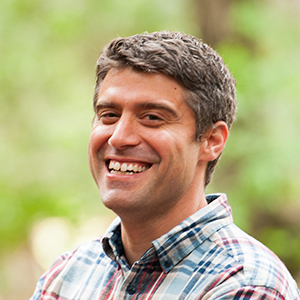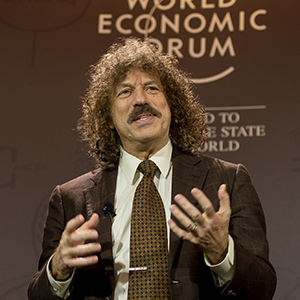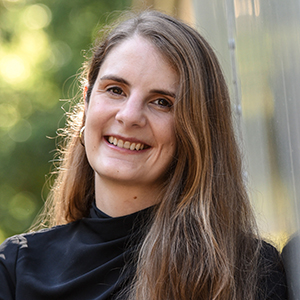Speakers
TED-Style Talk
Thursday, March 20, 2025
5:15-6:30PM
How Our Environments Shape The Way We Feel
 Olivia (Mandy) O’Neill, George Mason University
Olivia (Mandy) O’Neill, George Mason University
Culture and Emotions in Organizations: The Roots of a Thriving Workplace
Emotions are everywhere-in our daily interactions with strangers, in our relationships with friends and family, and in our workplaces. Yet for decades, research has largely examined emotions from the perspective of the human mind and body, overlooking the powerful role that culture and organizations play in shaping how we experience and express them. In this talk, I explore how metaphors have shaped our understanding of emotions in organizational life and why they need to change. Drawing on key findings from psychology, sociology, anthropology, and organizational behavior, I introduce a new metaphor, one that illuminates the influence of emotional culture for outcomes ranging from employee work and well-being to leadership, team functioning, and the organizational bottom line.
 David Lydon-Staley, University of Pennsylvania
David Lydon-Staley, University of Pennsylvania
Emotions and Media Entwined: How Our Feelings Guide and Reflect Media Engagement
Our media use is intimately bound up with our emotional experiences. Fluctuations in our emotions can lead us to engage with media, and media are often designed to elicit emotions upon exposure. With two examples, we will complicate our thinking about media’s effects on emotions by examining bidirectional associations between emotions and media. The first example will focus on people’s everyday engagement with the news. The second example will focus on epistemic emotions and their expression on knowledge-rich platforms (e.g., Wikipedia). Throughout, the need for intensive repeated measures data coupled with conceptual and analytic frameworks that capture the complex interplay between person and media environment will be emphasized.
 Gregory Bratman, University of Washington
Gregory Bratman, University of Washington
Nature Contact and Human Well-Being
Studies across multiple disciplines demonstrate an association of nature contact with human affective benefits. However, much less is known about the causal mechanisms underlying these effects. This presentation will explore the theories and potential pathways that help to explain these impacts, including new work at the nexus of environmental psychology and exposure science. For example, can measurement tools and insights from research on the harmful effects of pollution also be applied to investigate the beneficial effects of nature exposure? In these and other ways, increased understanding of the affective impacts of nature experience can be integrated into the broader context of research on environmental determinants of health. This talk will present a framework that addresses how various elements from our surrounding urban and natural environments interact to lead to negative affective outcomes in some cases, and positive emotional well-being in others, and how these processes can differ across individuals. Ultimately, this evidence can help guide decision-making in urban planning and landscape architecture — informing designs that aim to improve human health.
Keynote Symposium
Friday, March 21, 2025
1:45-2:45PM
Bringing Emotion Research to Life: Real-World Applications
 Katie McLaughlin, University of Oregon
Katie McLaughlin, University of Oregon
Leveraging affective science to promote youth mental health
Youth mental health problems have risen dramatically over the past fifteen years. Although decades of research in affective and clinical science have identified effective approaches to promote well-being and prevent the onset of youth psychopathology, the vast majority of young people never receive these evidence-based interventions. This talk reviews an innovative workforce development approach being undertaken at the Ballmer Institute for Children’s Behavioral Health at the University of Oregon to increase access to evidence-based behavioral health support for youth. Specifically, the Ballmer Institute has created a new bachelor’s level mental health profession—the child behavioral health specialist. Child behavioral health specialists are trained to deliver evidence-based strategies rooted in affective science to promote positive functioning and reduce the risk of developing mental health problems in settings where youth and families can easily access care, such as schools and pediatri primary care. This workforce approach aims to increase the scale and reach of evidence-based behavioral health interventions for youth, improve equity in access to these services, and diversify the behavioral health workforce. This innovative workforce development program represents a scalable approach to preventing the onset and progression of mental health concerns in young people and leveraging affective science for societal good.
 Sylvia Perry, Northwestern University
Sylvia Perry, Northwestern University
Discomfort and Change: How White Parents’ Emotional Signals During Conversations About Racism Influence Children’s Biases
People often struggle with difficult conversations, particularly when they anticipate discomfort or fear negative outcomes. White parents, for example, may avoid discussing racism with their children due to concerns that these conversations will be distressing or inadvertently increase their child’s racial biases. In this talk, I examine how parents’ emotional responses to these discussions relate to changes in their children’s implicit racial biases. Both laypeople and developmental scientists have cautioned that White parents’ nonverbal signals of discomfort during conversations about racism could reinforce negative racial attitudes in their children. To investigate these concerns, we developed a guided parent-child discussion paradigm designed to facilitate open, honest conversations about racism. Using a multi-method approach, we assessed parents’ verbal and nonverbal behavior, physiological responses, and implicit biases in both parents and children before and after the discussion. Our findings show that, even when White parents display discomfort, engaging in explicit, color-conscious discussions reduces their child’s anti-Black implicit biases. Notably, children whose parents exhibited stronger nonverbal concern showed the largest reductions, possibly because these signals conveyed the importance of the conversation. These findings challenge the notion that talking about racism increases bias and highlight the role of emotional communication in racial socialization. Implications for affective science, particularly in understanding how intra- and interpersonal emotional processes shape racial socialization and bias development, will be discussed.
 Judith Andersen, University of Toronto at Mississauga
Judith Andersen, University of Toronto at Mississauga
Mind Over Matter: Utilizing Psychophysiology and Biofeedback to Mitigate Police Lethal Force.
Science has demonstrated that internal physiological states during stress occur continuously to shape perception, cognition, emotion and behaviour. The role of police is unique among first responders, requiring the ability to successfully use weapons and tactics during intense physiological stress reactivity while simultaneously being ready to engage in controlled verbal-social interaction to de-escalate situations that do not call for the use of force. Clearly, maintaining flexibility between states of pure sympathetic and modified sympathetic/parasympathetic arousal is necessary and requires expertise in the modulation of the autonomic nervous system. Chronic stress and allostatic load further increase the risk of occupational errors and poor health outcomes among law enforcement officers. The current presentation describes a decade of research on the application of heart rate variability biofeedback (HRVB) in novel ways among law enforcement officers during active field training and assessment (Andersen, Arpaia & Gustafsberg, 2021). The talk will also address the associated benefits of training HRVB in police (e.g., reductions in use of force and shooting errors, improved health).
Elevating Diversity Science Event
Saturday, March 22, 2025
2:00-3:00pm
Why should we study “dark” emotions next to “positive” ones: schadenfreude as a case study
 Sa-kiera Hudson, UC Berkeley Haas School of Business
Sa-kiera Hudson, UC Berkeley Haas School of Business
In recent years, behavioral scientists have focused on the ways intergroup conflicts are maintained by a lack of positive emotions or through subtle forms of prejudice. However, “dark” and nasty emotions are present in society, as are blatant forms of discrimination, which current political events are illustrating. In this talk, I am going to focus on the dual roles of empathy (positive) and schadenfreude (negative) emotions in influencing intergroup conflict. Empathy is often hailed as the emotion to target in intergroup conflicts, as it predicts consequential prosocial behaviors that can help reduce inequality. And indeed, in many social conflicts, people struggle to feel empathy for those not part of their social groups. I will argue that while empathy is relevant for prosocial and helpful behaviors, it cannot adequately explain why people harm members of other groups. In my work I have developed a model that offers a more nuanced perspective, proposing that we need to incorporate a second, understudied emotion, namely schadenfreude, to understand people’s more nasty, harmful behaviors. Schadenfreude is the good feeling people have in reaction to another person’s pain and is especially likely to manifest when group dynamics are competitive. I suggest that group threat, as embedded within social contexts and people’s ideologies, is an important motivator for feeling empathy and schadenfreude (or not) towards outgroups and low-status groups. Further, these emotions can help explain individuals’ policy support and even behaviors, such that empathy is the emotion primarily involved in helping other groups while schadenfreude is the emotion primarily involved in harming other groups. I discuss the implications of these findings to the maintenance of unequal social hierarchies.
Presidential Symposium
Saturday, March 22, 2025
5:00-6:15
Past, President, and Future: Perspectives on Affective Science
 Rachael Jack, University of Glasgow
Rachael Jack, University of Glasgow
Understanding cultural diversity in facial expressions of emotion
Are facial expressions of emotion culturally universal? This question has fueled scholarly debate for over a century, challenging researchers to decode the complex dynamic facial movements that humans use to communicate emotions. While methodological limitations have long hindered progress, recent advancements in data-driven technologies now offer unprecedented opportunities to unravel this mystery.
Working with interdisciplinary colleagues, I have worked to push the boundaries of how we understand facial expression communication across cultures. In this talk, I will highlight research that has reshaped foundational theories and expanded real-world applications, including social robotics. By linking this work to the broader mission of the Society for Affective Science, I will also reflect on how emerging innovations in our field can further advance affective science and our societal impact as a community.
 Robert Levenson, University of California, Berkeley
Robert Levenson, University of California, Berkeley
A Fistful of Gizmos
Bob will summarize some of his past and present research on the biobehavioral aspects of emotions and their role in close relationships, age, culture, and disease, acknowledging devices and methods that made this research possible
 Maya Tamir, Hebrew University of Jerusalem
Maya Tamir, Hebrew University of Jerusalem
Where do you want to get to?
Where we want to get to is a critical question in our personal lives, scientific endeavors, and collective actions. Maya will discuss how it has guided her research on emotion regulation, and explain why it is important to keep asking it across domains.
2024 Awards Symposium
Friday, March 21
11:15 a.m. – 12:15 p.m.
Why Mixed Feelings Matter, When Feeling Good Can Backfire, and What We Believe Empathy To Be
 Anthony Vaccaro, University of Southern California
Anthony Vaccaro, University of Southern California
Best Dissertation in Affective Science Award (2024)
“No Ambivalence About It: Mixed Feelings are Essential to a Full Theory of Affective Neuroscience”
Mixed feelings-simultaneously experiencing positive and negative emotions-are commonly reported in day to day life. These moments can be confusing, meaningful, distressing, reflective of complexity, or even aesthetically beautiful. Yet, compared to their ubiquity, they remain vastly understudied in affective science, and especially in neuroscience. These experiences are understudied largely due to methodological difficulties in including them in our standard measures, as well as their general absence from prominent theories of affect in the brain. In this talk, I will propose that exploring the processes and scenarios of when people report mixed feelings is an essential stepping stone to a comprehensive theory of affect. Additionally, I will discuss some of my fMRI studies which have aimed to address questions about mixed feelings on both a state level, and within the broader scope of well-being. Altogether, this talk aims to propose new directions and questions for affective neuroscience, and demonstrate both their theoretical and practical importance.
 Brett Q. Ford, University of Toronto
Brett Q. Ford, University of Toronto
Early-Career in Affective Science Award (2024)
“The Costs and Benefits of Striving to Feel Good”
The ability to manage emotional responses to stressors is crucial for our well-being. However, striving to feel good can also generate trade-offs between personal and collective well-being. One striking example of this phenomenon comes from politics, a source of chronic stress for many people. While effective emotion regulation can help individuals maintain well-being during political turmoil, it may also dampen the emotion-driven motivation needed to take collective action aimed at addressing the political systems causing their distress. Using daily diary and experimental designs across thousands of participants, we find that political stress is common, and people frequently use emotion regulation to alleviate this distress. In turn, they experience greater emotional well-being but weaker motivation to engage in collective political action, a cornerstone of functioning democracy. This research illustrates the dilemmas that can arise when coping with stress and highlights the importance of identifying forms of emotion regulation that can provide emotional relief without jeopardizing important community-serving behaviors.
 Jamil Zaki, Stanford University
Jamil Zaki, Stanford University
Mid-Career Trajectory in Affective Science Award (2024)
“What We Pretend Empathy Is”
The novelist Kurt Vonnegut once wrote, “we are what we pretend to be, so we must be careful what we pretend to be.” Scientists have long debated the nature of empathy, our ability to connect with each other’s emotions. But lay theories about empathy–what people pretend it is–can also powerfully shape the way they use it. This talk will survey our lab’s work on the power of empathic beliefs, and our efforts to shift those beliefs to help people connect more effectively.
2025 Awards Symposium
Saturday, March 22
10:00 a.m.-11:00 a.m.
How Gratitude Shapes Decisions, What Daily Life Teaches Us About Emotion Regulation, and What Aging Reveals About Affect
 Ke Wang, University of Virginia
Ke Wang, University of Virginia
Best Dissertation in Affective Science Award (2025)
“Essays on Emotion and Decision Making, with Implications for Policy”
Despite significant growth in the field of emotion and decision-making, two areas remain relatively underdeveloped: the role specific positive emotions play in decision-making and the role of emotion regulation over time. My dissertation tackled these gaps with three sets of studies. The first set challenged the prior meta-analytic conclusion that positive emotions have no protective effects on appetitive risk behaviors. Extending the Appraisal Tendency Framework (ATF), we hypothesized and found that gratitude, but not all positive emotions, discouraged tobacco use, a major cause of preventable death. The second set of studies challenged the assumption that gratitude necessarily confers salutary effects on moral decision-making. Extending social-functional theories of emotion and the ATF, we predicted and found that gratitude increased cheating when cheating would benefit others. The last set of studies evaluated the extent to which a brief reappraisal intervention would create long-term benefits for the early education workforce, a group with the highest burnout rates in the U.S. Prior emotion regulation research has rarely examined this population and largely focused on short-term outcomes. My presentation will share the results of the studies and discuss how they extend our understanding of appraisal processes in affective science, with practical takeaways for creating a healthier, more ethical, and resilient society.
 Elise Kalokerinos, University of Melbourne
Elise Kalokerinos, University of Melbourne
Early-Career in Affective Science Award (2025)
“Mapping emotion regulation in everyday life”
Emotion regulation is inherently dynamic, unfolding iteratively over time. This means that emotion regulation is ideally captured in everyday life, where we can map changes in near-to real-time in response to personally impactful events. In this talk, I will introduce research using daily-life methods, showing that these methods have allowed for the investigation of new emotion-regulation questions, skills, and contexts that would have remained hidden with more traditional methods. First, using daily-life data allows us to ask different kinds of questions, taking a more descriptive approach to emotion-regulation process. For example, in our work, we have mapped the prevalence of emotion regulation processes outside the lab, demonstrating that emotion regulation is relatively rare. Second, we can use daily life data to explore skills requiring dense, repeated-measures data. In particular, our work has demonstrated that emotion differentiation – the precise labelling of emotional experiences, measured using repeated emotion assessments across contexts – enables effective emotion regulation. Third, daily-life data allows us to capture regulation across many different, personally-impactful, contexts, and to determine how those contexts shape outcomes. For example, our research has shown that during uncertain waiting periods, regulatory strategies that are typically effective can backfire.
 Derek Isaacowitz, Washington University in St. Louis
Derek Isaacowitz, Washington University in St. Louis
Mid-Career Trajectory in Affective Science Award (2025)
“Aging as a Model System for Affective Science”
What can the study of human aging tell us that informs affective science more generally? I consider 2 ways in which investigating aging can be helpful to affective scientists: first, it forces a consideration of both between-group differences as well as within-person changes in affective processes. Taking the study of emotion regulation specifically, despite an explosion of research on the frequency and effectiveness of different strategies, it may not be the case that the strategy level is most useful for considering between-group differences and within-person changes. Instead, studying aging suggests that the tactic level may be especially useful, though tools are still needed that can account for the hierarchical nature of dynamic changes in emotion regulation behavior. Second, investigating aging also forces a consideration of how affective processes unfold in the context of physical, cognitive and neural changes that happen with advancing age. For example, findings that age-related positivity effects vary between the lab and home constrain causal mechanisms that might underlie positivity effects when observed. Assertions that some emotion regulation behaviors are more cognitively-demanding than others may need revision given that older adults with a range of cognitive abilities still seem to be able to use them. Together, studying affect in the context of aging can inform the plausibility of theoretical models in affective science more generally.







 Sa-kiera Hudson, UC Berkeley Haas School of Business
Sa-kiera Hudson, UC Berkeley Haas School of Business


 Anthony Vaccaro, University of Southern California
Anthony Vaccaro, University of Southern California Brett Q. Ford, University of Toronto
Brett Q. Ford, University of Toronto Jamil Zaki, Stanford University
Jamil Zaki, Stanford University Ke Wang, University of Virginia
Ke Wang, University of Virginia Elise Kalokerinos, University of Melbourne
Elise Kalokerinos, University of Melbourne Derek Isaacowitz, Washington University in St. Louis
Derek Isaacowitz, Washington University in St. Louis




